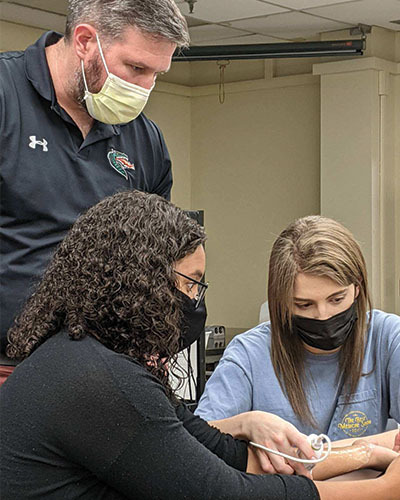In mid-October, 25 medical students gathered for a Special Topics course teaching procedures that could become a frequent feature of their lives if they go into family medicine.
Held from Oct. 19 to 22, the course included sessions on ultrasound use in primary care and sports medicine, joint injections, women’s health and wound care. Providers from the Department of Family and Community Medicine, the Cahaba-UAB Family Medicine Residency, the Gadsden Regional Medical Center Family Medicine Residency and the St. Vincent’s Family Medicine Residency (Christ Health Center) taught the four sessions, which totaled about 20 hours of hands-on learning for students.
 “We wanted to offer procedures training that students would not be able to access on their own,” said Assistant Professor Ksenia Blinnikova, M.D., MPH, who led organization and curriculum planning for the Special Topics course. “Students got a lot of hands-on experience and they also got to see the full scope of family medicine in the breadth of the topics.”
“We wanted to offer procedures training that students would not be able to access on their own,” said Assistant Professor Ksenia Blinnikova, M.D., MPH, who led organization and curriculum planning for the Special Topics course. “Students got a lot of hands-on experience and they also got to see the full scope of family medicine in the breadth of the topics.”
“This was a good opportunity for students to learn more about family medicine and about different residency programs in the area.”
MS2 student Claire Wilson said all four workshops were helpful and rewarding.
“It was especially helpful to get to meet with the residency programs in Birmingham and learn from residents, learn about women’s health procedures to prepare for clinical rotations and have a wonderful preview of the musculoskeletal system and different relevant pathologies,” Wilson said. “The ultrasound workshop and joint injection workshop were really well done and targeted at clinical skills that are more up and coming which was exciting.”
Students practiced using ultrasound in diagnosing and treating injuries and performing joint injections, and learned about colposcopy, endometrial biopsy, IUDs and OB laceration repair in the women’s health session, led by faculty from the Cahaba-UAB Family Medicine Residency.
“Students had the opportunity to not only learn about these topics but also gain hands-on practice,” said Mojica Catarina, associate residency program coordinator at Cahaba Medical Care.
Bradley Green, M.D., a faculty member with the Gadsden Regional Medical Center who helped teach the joint injection session, focused on treatments for the knee and shoulders.
"It was great working with the medical students for the joint injection course. Everyone was engaged and we all had a blast practicing with the knee and shoulder injection models,” Green said. “Procedures are an important part of family medicine, so we're happy to share a bit of what we do every day."
On the last day of the course, students learned about wound care and use of an Unna boot, a gauze dressing filled with zinc paste. The dressing is used to treat venous stasis ulcers, wounds on the leg or ankle caused by damaged veins.
Cleon Rogers, M.D., who taught the workshop, said he sees similar wounds every day at his practice with Christ Health.
“Venous statis ulcers can really isolate people from their community, because they cause wounds that have an odor and that drain. People don’t feel comfortable going out or going to work,” Rogers said. He talked to students not only about wound care, but about the importance of recognizing the stigma that might come with some wounds.
“We really want to train them not only to treat the wound, but to help patients integrate back into society and overcome social stigma and disenfranchisement. Left untreated, these wounds can cost people their job,” he said, noting that venous statis ulcers typically do not feature in medical education, leading to misdiagnosis, delayed treatment and further frustration for patients.
As future physicians, students must learn to advocate for their patients in those cases, Rogers said, and start treatment early to maximize success.
“We at Christ Health are happy to be part of providing that education, especially for students who will provide primary care to underserved and disenfranchised communities,” Rogers said.
Dalton Frederick, also an MS2 student, believes what he learned during Special Topics week will help him as he moves forward in his medical education.
“We can learn a lot of things in a classroom, but it is very rewarding to be able to apply those things in practice with the help of all the residents and physicians that helped make the Special Topics week possible. Covering women’s health, ultrasound, MSK joint injections and wound care, we learned valuable clinical knowledge helping us go forward.”